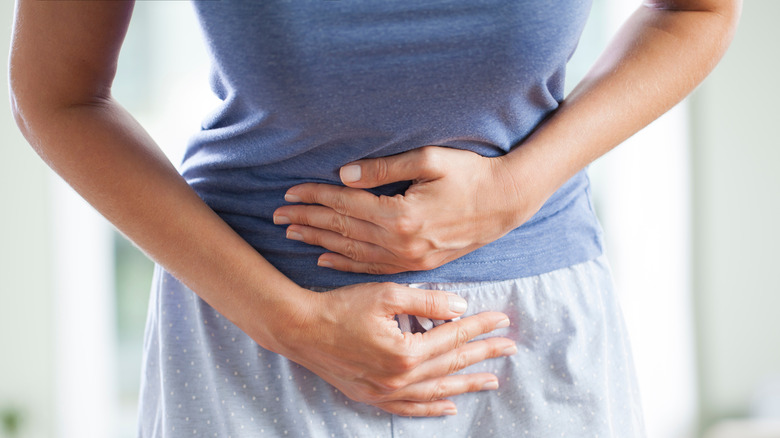Common Causes Of Abdominal Distension
Abdominal distension happens when the stomach swells abnormally, often causing a feeling of bloating. The abdomen is the area of the body that contains the digestive organs, including the stomach, intestines, and liver. When the stomach or intestines become filled with gas, fluid, or digestive contents, the abdomen can expand and feel tight or bloated. The sensation of bloating can be accompanied by other symptoms, such as pain, cramping, and nausea.
Bloating can be uncomfortable and may interfere with daily activities, but it is rarely a sign of a serious health problem. However, in some cases, abdominal distension can indicate a more serious underlying condition, such as ovarian cancer, ascites, or liver disease, according to the Cleveland Clinic. If bloating is persistent, severe, or accompanied by other symptoms like vomiting or diarrhea, it's important to consult a doctor to rule out any serious underlying health problems. They may also be able to recommend treatments to help you manage the condition.
What causes abdominal distension?
Abdominal distension can occur for various reasons, and excess gas in the intestines is a common cause. Constipation is another potential cause of bloating. When stool is not passed out of the body, it can accumulate in the colon, causing the abdomen to feel distended. According to the Cleveland Clinic, bacterial overgrowth in the small intestine, as well as other digestive disorders like inflammatory bowel disease (IBD), can cause bloating. This chronic condition affects the large intestine and can cause other symptoms, abdominal pain, and changes in bowel movements. Bloating is also a common symptom of irritable bowel syndrome (IBS), another digestive disorder that can cause constipation and diarrhea.
Lactose intolerance or other food intolerances, such as gluten or fructose intolerance, can lead to abdominal bloating, per Healthline. Other factors contributing to abdominal distension include menstruation or pregnancy, significant weight loss, and gastroparesis, which causes stomach paralysis (via the Cleveland Clinic).
How are abdominal distension and bloating treated?
Various treatment options can help alleviate symptoms of bloating and distension and improve the overall quality of life. However, treatment may depend on the underlying cause and severity of the condition. Dietary changes are one of the most effective ways to alleviate abdominal distension. It is recommended to reduce the intake of gas-producing foods, such as beans, cabbage, and broccoli, according to Healthline. Adding more probiotic foods and enzymes may help improve digestion, according to the Cleveland Clinic. Eating smaller meals throughout the day and identifying any food sensitivities can also help reduce abdominal distension symptoms. In severe cases, laxatives can help alleviate constipation, while gas bubbles can be broken down with activated charcoal, per the Cleveland Clinic.
If an underlying medical condition like liver disease or inflammatory bowel disease is causing abdominal distension, treating the condition is necessary to minimize the symptoms. For irritable bowel syndrome, Healthline advises reducing stress levels and increasing fiber intake.



